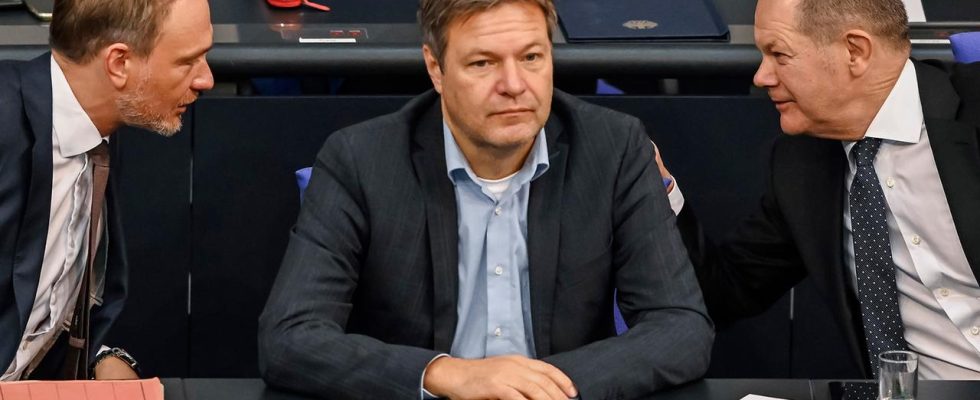Finance Minister Lindner wants to oblige the ministries to save, but some are opposed. Chancellor Scholz wants to untie the knot with three-way talks in the Chancellery. Time is running out.
The negotiations lasted for months, and now the 2024 budget is a top priority. “It is true that Federal Finance Minister Christian Lindner and the Chancellor are holding budget talks with some colleagues in the department,” the Finance Ministry said after long speculation and unconfirmed reports.
And further: The procedure is not new, there have already been similar processes in the past. So everything is in the best of order, according to a spokeswoman in Lindner’s house. And indeed, in the past, chancellors have repeatedly intervened in difficult budget negotiations.
The dispute has been smoldering for months
It can hardly be overlooked that the current budget negotiations are also difficult. For months there have been problems with the line-up for the coming year. In May, Lindner announced that the planned cabinet decision on the 2024 budget on June 21 could not be kept.
Lindner has also been waiting for the key figures of the 2024 budget since March. These should actually determine what expenditure the federal government is planning and what funds the individual ministries are entitled to in the coming year. Because Lindner was unable to coordinate with his cabinet colleagues, he waived these benchmarks for the time being.
Climate protection and debt brake
At the core are the concerns of the Greens, about climate protection measures or the planned basic child security. Finance Minister Christian Lindner, in turn, relies on the debt brake and has the support of Chancellor Olaf Scholz.
One hears increasingly annoyed tones from Green coalition circles about the role of the Federal Chancellor, whom some privately accuse of lacking leadership and that he is even damaging his own government by acting late.
The deputy leader of the FDP parliamentary group, Christoph Meyer, is backing the Chancellor, who, with his support for the debt brake, is “on the side of the Basic Law” and is showing leadership. “We no longer have an emergency,” says Meyer. Therefore, the budget must also return to normal.
20 billion euros are missing
But so far there hasn’t even been a draft budget for the new year, but there is pressure to save: Because of a funding gap of 20 billion euros, Finance Minister Lindner ordered a “spending cap” for each ministry last week – totaling a high single-digit billion amount. The houses should now suggest themselves where they could save the money. The procedure was coordinated with Chancellor Scholz and Vice Chancellor Robert Habeck.
According to various media reports, half a dozen ministries are said to be particularly affected, above all Annalena Baerbock’s Ministry of Foreign Affairs, Lisa Paus’ Family Ministry, Volker Wissing’s Ministry of Transport and Nancy Faeser’s Ministry of the Interior.
The pressure is growing
There is now resistance to these austerity measures, which the Chancellor wants to solve in three-way talks consisting of himself, the finance minister and the respective minister. According to the Ministry of Finance, this procedure was announced to the cabinet members at the end of May and justifies this with the “clarification requests” made by some cabinet members, or in other words: some ministers do not agree with Lindner’s austerity plans.
The pressure on all traffic light coalition partners is growing every day and there are special hurdles waiting for the new year: For the current 2023 budget, Lindner relied on so-called special funds, loans that are not included in the federal budget. With them, the finance minister was able to shoulder the special expenses for the Bundeswehr and the high energy costs and still comply with the debt brake.
In the coming year it will be much more difficult. Added to this is the time pressure and the expectation that the Bundestag will be able to submit a finished draft budget before the summer break on July 5th.

